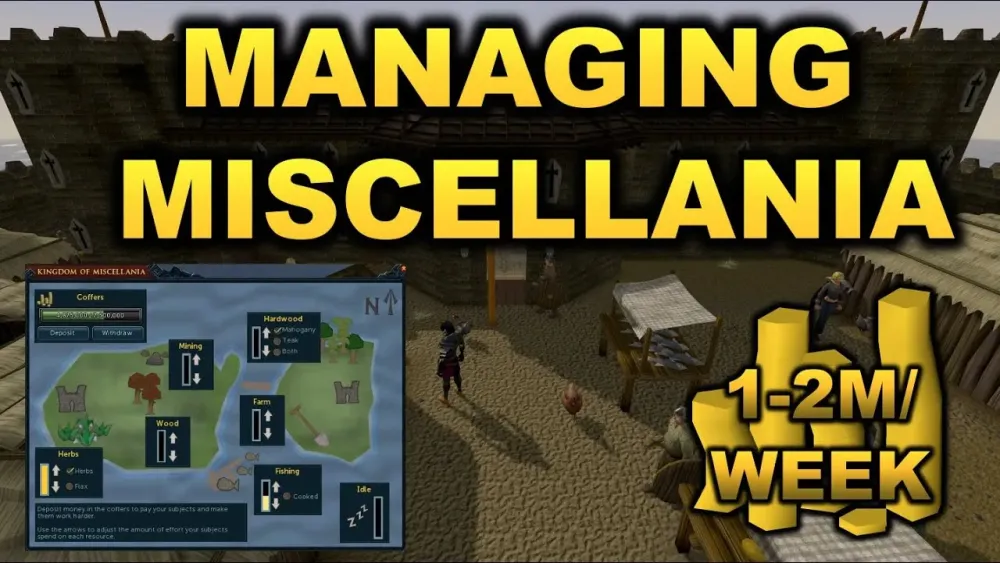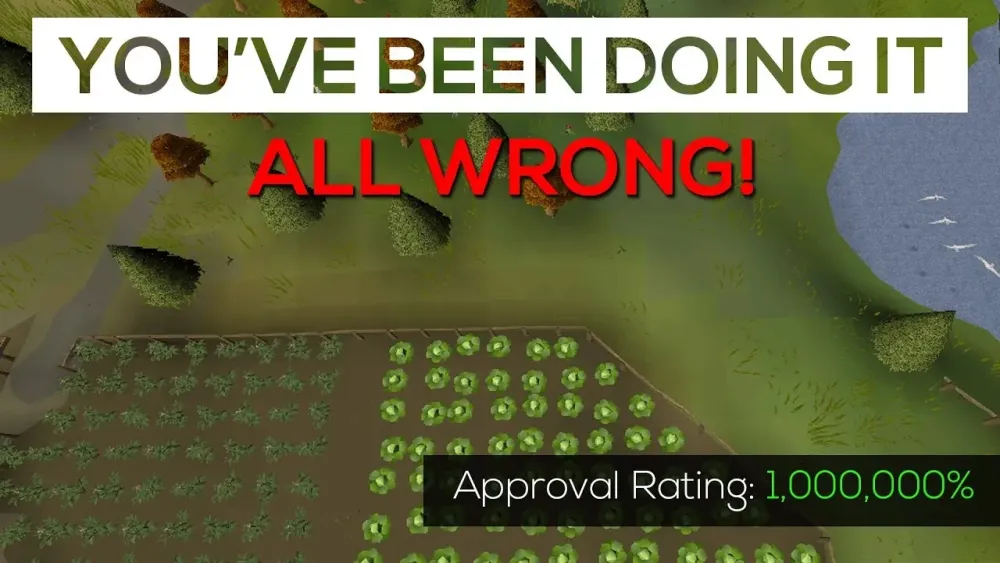Your cart is empty
How to Maximize Profit from Managing Miscellania in OSRS: A Complete Guide

Warning: Undefined variable $post in /home/osrsmoneymaking.guide/public_html/wp-content/themes/kadence/functions.php on line 391
Warning: Attempt to read property "ID" on null in /home/osrsmoneymaking.guide/public_html/wp-content/themes/kadence/functions.php on line 391
Managing Miscellania in Old School RuneScape (OSRS) is one of the most reliable passive income methods for players looking to earn gold without constant grinding. Unlocked after completing the Throne of Miscellania quest—and significantly enhanced by Royal Trouble—this activity allows you to assign citizens to gather resources like herbs, logs, and coal. When optimized, it can net you substantial profits with minimal daily effort. In this guide, we’ll break down how to maximize your Miscellania profits, including the best resource allocations, approval rating tips, and long-term strategies—all tailored for 2025’s economy.
Before diving into profit optimization, let’s cover the essentials. Managing Miscellania is a repeatable activity where you, as the regent of the island, direct its citizens to collect resources. Your profits depend on three key factors: your approval rating, the funds in your kingdom’s coffers, and how you allocate your workers. Completing Royal Trouble boosts your worker count from 10 to 15 and increases the daily wage cap from 50,000 to 75,000 coins, making it a must-do for serious profiteers.
How It Works
Each day, 10% of your coffer’s funds (up to the cap) is deducted to pay workers, and resources are generated based on your approval rating and worker distribution. You can collect these resources daily, but waiting a few days often yields better returns due to bonus items like bird nests or herb seeds.
Why It’s Profitable
The beauty of Miscellania lies in its passive nature. High-value resources like mahogany logs, herbs, and coal can be sold on the Grand Exchange (GE) for a profit that often exceeds your daily investment—especially with smart management.
Setting Up for Maximum Profit

To turn Miscellania into a gold-making machine, you need to set it up correctly from the start. This involves maximizing your approval rating, funding the coffers adequately, and choosing the right resources.
Maintaining 100% Approval Rating
Your approval rating directly impacts resource output—it’s a multiplier for productivity. At 100%, you get the maximum yield; anything less reduces your haul. Here’s how to keep it maxed:
- Rake Weeds: The fastest method—head to the farming patches and rake weeds until you hit 100%. Takes about 5 minutes.
- Chop Trees: Use a hatchet on maple, teak, or mahogany trees for a slower but still effective boost.
- Mine Coal: Mining coal in the Miscellania caves works too, especially if you’re training Mining.
- Avoid Negative Actions: Killing citizens or stealing from stalls drops your rating by 3% or 5%, respectively—steer clear!
After Royal Trouble, your rating drops by 1% daily (instead of 2.5%), so weekly maintenance is sufficient.
Filling the Coffers
The kingdom’s coffers need at least 750,000 coins (post-Royal Trouble) to ensure the full 75,000 daily wage is deducted. Ideally, deposit 1.5–2 million coins to avoid frequent top-ups. The maximum storage is 7.5 million coins, giving you over 100 days of hands-off operation.
Best Resource Allocations for Profit in 2025
Resource profitability fluctuates with GE prices, but some options consistently outperform others. After Royal Trouble, you have 15 workers, with a maximum of 10 per resource type. Here’s how to allocate them for maximum profit based on current trends.
Top Resource Choices
- Mahogany Logs (10 Workers): These fetch high prices (around 400–500 gp each) and yield bird nests (1 per 350 logs), which can contain valuable seeds or rings. Expect 892 logs daily at 100% approval, plus 2–3 nests.
- Herbs (5 Workers): Herbs like ranarr and toadflax, plus their seeds, are in demand for Herblore. You’ll get 50–60 herbs daily with 5 workers, often netting 30–50k gp plus seed bonuses.
- Coal (Alternative): If mahogany or herb prices dip, coal (200–250 gp each) is a stable fallback. Ten workers yield ~1,000 coal daily, good for Smithing or selling.
Sample Allocation Table
| Resource | Workers | Daily Yield (100% Approval) | Approx. GP Value |
|---|---|---|---|
| Mahogany Logs | 10 | 892 logs + 2–3 nests | 400k–500k |
| Herbs | 5 | 50–60 herbs + seeds | 30k–50k |
| Total | 15 | – | 430k–550k |
Note: Subtract the 75k daily cost for net profit (355k–475k gp).
Checking Profitability
Use the OSRS Wiki Miscellania Calculator to adjust allocations based on live GE prices. For example, if herb seeds spike (e.g., ranarr seeds at 50k+), prioritize herbs over logs.
Optimizing Your Routine for Efficiency
Managing Miscellania isn’t just about allocation—it’s about integrating it into your gameplay efficiently. Here’s how to streamline the process.
Daily vs. Weekly Collection
Collecting daily maximizes control but takes time. Waiting 3–7 days lets resources and bonuses accumulate, often boosting profit-per-visit. For example, a week of mahogany logs yields ~6,244 logs and 17–18 nests, pushing profits past 3 million gp after costs.
Teleportation Tips
Use these for quick access:
- Ring of Wealth: Teleports you to the throne room (requires Throne of Miscellania).
- Fairy Ring (CIP): Drops you northwest of the castle (needs Fremennik Trials).
- Rellekka Boat: Free but slower—use if you’re nearby.
Combining with Other Activities
Pair Miscellania visits with herb runs or birdhouse runs on Fossil Island. Rake weeds while checking the Etceteria bush patch to multitask approval and Farming XP.
Long-Term Profit Strategies and Pitfalls to Avoid
For sustained wealth, think beyond daily profits. Here’s how to make Miscellania a cornerstone of your OSRS bank.
Investing Profits
Sell resources and reinvest into skills like Herblore (using herbs) or Construction (mahogany planks). Alternatively, flip GE items to grow your cash stack faster.
Avoiding Common Mistakes
- Neglecting Approval: Letting it drop below 75% slashes profits—check weekly.
- Underfunding Coffers: Below 750k, you won’t hit the 75k wage cap, reducing output.
- Ignoring Market Trends: Sticking to one allocation when prices crash (e.g., mahogany at 300 gp) wastes potential.
Ironman Considerations
For Ironmen, prioritize herbs for Herblore supplies and logs for Construction/Fletching. Profit isn’t the goal—resource self-sufficiency is.
By mastering Managing Miscellania, you can generate 300k–500k gp daily with just 5–10 minutes of weekly effort. Whether you’re a casual player or a gold-hungry veteran, this method remains a low-effort, high-reward staple in OSRS. Start today—fill your coffers, max your approval, and watch the profits roll in!
Warning: Undefined variable $post in /home/osrsmoneymaking.guide/public_html/wp-content/themes/kadence/functions.php on line 391
Warning: Attempt to read property "ID" on null in /home/osrsmoneymaking.guide/public_html/wp-content/themes/kadence/functions.php on line 391

